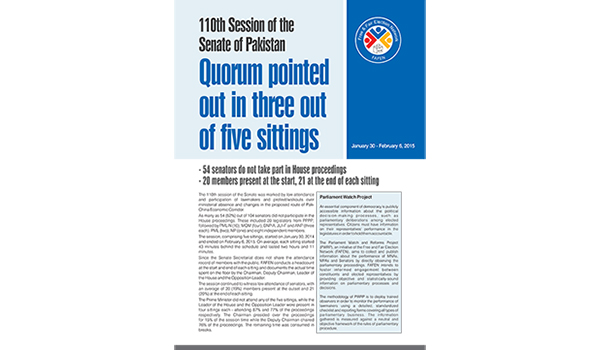 The 110th session of the Senate was marked by low attendance and participation of lawmakers and protest/walkouts over ministerial absence and changes in the proposed route of Pak-China Economic Corridor.
The 110th session of the Senate was marked by low attendance and participation of lawmakers and protest/walkouts over ministerial absence and changes in the proposed route of Pak-China Economic Corridor.
As many as 54 (52%) out of 104 senators did not participate in the House proceedings. These included 20 legislators from PPPP; followed by PML-N (10); MQM (four); BNP-A, JUI-F and ANP (three each); PML (two); NP (one) and eight independent members.
The session, comprising five sittings, started on January 30, 2014 and ended on February 6, 2015. On average, each sitting started 43 minutes behind the schedule and lasted two hours and 11 minutes.
Since the Senate Secretariat does not share the attendance record of members with the public, FAFEN conducts a headcount at the start and end of each sitting and documents the actual time spent on the floor by the Chairman, Deputy Chairman, Leader of the House and the Opposition Leader.
The session continued to witness low attendance of senators, with an average of 20 (19%) members present at the outset and 21 (20%) at the end of each sitting.
The Prime Minister did not attend any of the five sittings, while the Leader of the House and the Opposition Leader were present in four sittings each – attending 87% and 77% of the proceedings respectively. The Chairman presided over the proceedings for 15% of the session time while the Deputy Chairman chaired 76% of the proceedings. The remaining time was consumed in breaks.
The House witnessed the introduction of two private and two government bills. The private bills included the Corporate Rehabilitation Bill 2015 and the Torture and Custodial Death (Punishment) Bill 2014 while the government bills were the Stock Exchanges (Corporatization, Demutualization and Integration) (Amendment) Bill 2015 and the Companies (Amendment) Bill, 2015. All these bills were referred to the relevant standing committees. In addition, the Gas Infrastructure Development Cess Ordinance 2014 was also laid during the session.
The House adopted three resolutions during the session – one each to express grief over the demise of King Abdullah Bin Abdul Aziz; taking steps for elimination of corruption and to express solidarity with the people of Kashmir on the occasion of Kashmir Solidarity Day.
A total of 18 points of order (POs) consumed 41 minutes (6%) of the session time. However, none of the POs were able to receive a formal ruling from the Chair. Unless the Chair gives a formal ruling on a PO, it does not lead to any assembly output.
The House witnessed six walkouts during the session that consumed 24 minutes. Two walkouts were staged to protest ministerial absence, with another two against proposed change in the route of Pak-China Economic Corridor and one each over law and order in Karachi and unsatisfactory ministerial response on a calling attention notice.
To view the document, click here
This publication has been produced with the assistance of the European Union. The contents of this publication are the sole responsibility of FAFEN and can in no way be taken to reflect the views of the European Union. This session report is based on direct observation of the Senate proceedings conducted by PATTAN Development Organization – a member organization of FAFEN. Errors and omissions are regretted








